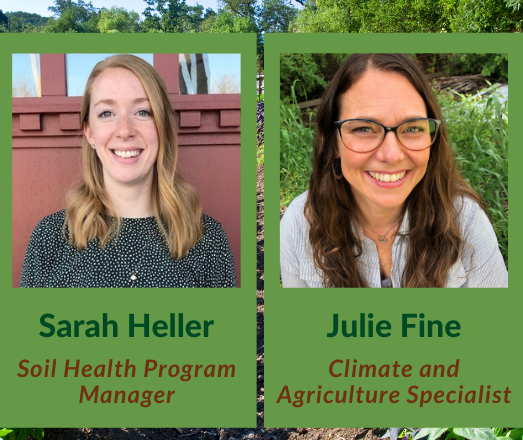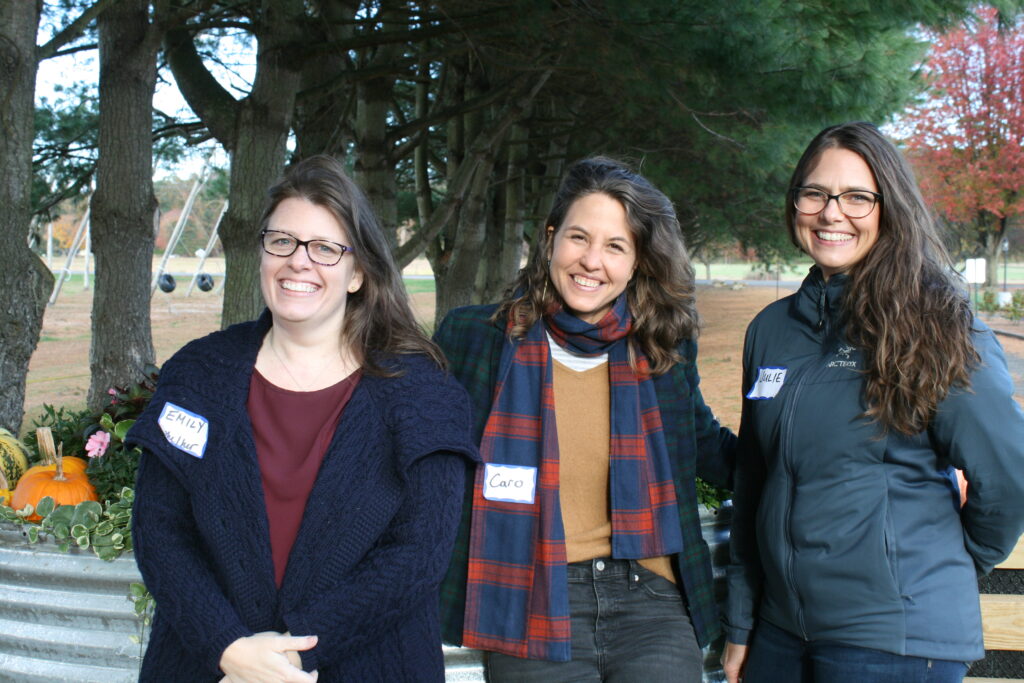AFT’s Woman Led New England Team Advances Soil Health into the Future
American Farmland Trust added two new staff members to the New England Climate and Agriculture team, who will further one of AFT’s core priorities: promote sound farming practices. Not only do they bring essential skills in farmer engagement, project management, and technical support, but they also round out an all-woman soil health team in New England.
Sarah Heller joins AFT as New England Soil Health Project Manager, overseeing the Western New England Regenerative Agriculture project, the largest soil health project in New England history. This project will provide over $15 million in resources and support to livestock farmers in New Hampshire, Vermont, Massachusetts, and Connecticut to adopt regenerative practices on their farms.
Julie Fine, New England Climate and Agriculture Specialist, will provide technical assistance and on-the-ground soil health programming to New England farmers. The future of climate-smart farming requires regenerative agriculture and soil health practices as vital solutions for farmers of all generations.

AFT is dedicated to supporting farmers to adopt climate-smart practices. In New England, the threat of climate change is increased by excess development. According to AFT’s Farms Under Threat: A New England Perspective, “between 2001 and 2016, approximately 105,500 acres were either lost or threatened by development. Of the acres that were impacted, 35 percent (37,300) of farmland acres were lost to other uses, such as parking lots and buildings (“urban & highly developed,” UHD) while 65 percent (68,200) of farmland acres were severely impacted by encroaching development and may already be lost, or are likely to be irreversibly lost in the near future (to “low-density residential development,” or LDR).” As these threats increase, climate-resilient practices will help farmers protect their land and their future operational resilience and economic viability.
The New England Climate and Agriculture team has grown over the last two years. Emily Cole, Ph.D., New England Deputy Director, leads the Climate and Agriculture team in the region. Caro Roszell joined AFT in March to facilitate the Massachusetts Coordinated Soil Health Program, a partnership between AFT and MDAR (Massachusetts Department of Agricultural Resources) that is building a soil health program that serves both conventional and organic producers. With the additions of Sarah Heller and Julie Fine, the team of four can continue to work on fulfilling the need for financial and technical support for farmers in New England and to innovate with, improve and scale up their soil health management systems.

“We have worked to build the best soil health team we can here at AFT – a team with the technical knowledge to help farmers adapt to climate change and improve soil health,” said Emily Cole, PhD, AFT’s New England Deputy Director. “Equally important, however, is a team that understands the many barriers to adopt soil health practices and can meet farmers where they are to support their soil health journey. Our goal is to increase access to soil health technical and financial assistance to farmers across New England. As the demographics of farmers continue to shift, including the increasing number of women who are principal operators or farm workers, AFT is working to reflect that shift within our own efforts. “
Soil science is rapidly changing, with more women pursuing careers in it than ever before. Since 2010, women graduating from programs in agriculture and natural resources has grown by 48 percent, compared to 22 percent in men, according to the National Science Foundation annual survey. This means 49 percent of graduates from agriculture and natural resource programs are women. Despite this growth, women still hold significantly fewer resource-focused positions (Vaughan et al., 2019). AFT recognizes that there are many barriers that impact women and, as an organization, we commit to addressing these disparities alongside our work to confront racism and inequality.
“There is a great deal of critical work to be done to accelerate the adoption of diverse, locally adapted, regenerative, soil health building, climate-smart production systems in New England and across the nation. That work needs diverse perspectives and broad, innovative thinking, and we are building that as we bring female leaders to the agricultural community that have not, in the past, had the opportunity to thoroughly contribute,”
said Bianca Moebius-Clune, PhD, AFT’s National Climate Initiative Director. “I am excited about the diversifying community of agricultural leaders – together across all participants in this movement, we can change the face of agriculture to resiliently carry us into the future.”
AFT believes all farmland soils should be managed to increase their productivity and resiliency over time and minimize production environmental impacts. According to AFT’s Women for the Land project, 43 percent of U.S. farmland is farmed or co-farmed by women. Although AFT has found that most women landowners are conservation-minded, they often lack relationships with agencies that can provide the information, tools, and confidence they need to act. Building a team of women to engage with farmers around soil health practices not only opens new opportunities for connection but also begins to change the face of soil health work.
“As a sole proprietor, I’ve been tasked with mastering the ins and outs of vegetable production, sales, business operations, pest and disease management, and of course-soil health,” said Amanda Baker, owner, and operator of Cotyledon Farm. “Soil is the foundation of farming, yet the most enigmatic component for me to understand and to make changes in. I’m excited to work with American Farmland Trust. Having support, especially from other women in the field, offers practical advice, resources, and encouragement that I haven’t had in the past. I’ve already implemented a few trials after my conversation with Caro and Julie, and I’m looking forward to their visit and continued support.”
AFT is committed to advancing current regenerative agriculture practices, while also building systems that support transformational change across the field of agriculture itself. In New England, this can mean helping small farmers gain access to technical and financial assistance related to soil health, specifically urban and peri-urban producers. It also means building and deepening new and existing relationships with farmers, providing on-the-ground learning opportunities, and facilitating easier access to funding and other financial assistance programs. AFT looks to create a resilient future for farmers, and ultimately, save our land.

